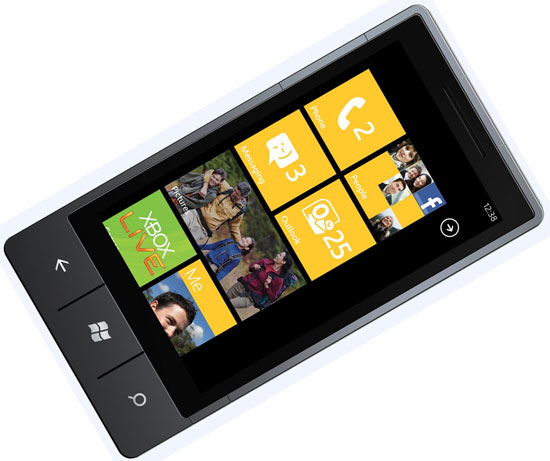|
|
Continue reading ETI Views and News at
econtech.com,
or download a
printer-friendly version.

Follow us on Twitter @EconAndTech
|
|
Is Windows Phone OS a contender?
|
|
 It wouldn't be all that surprising if you missed AT&T's launch of the Nokia Lumia 900 the first Windows Phone handset for AT&T earlier this month. The Lumia debuted with technical problems internet connectivity was spotty at best and the phone runs on an older version of Windows Phone7.5 while version 8 is due out later this year. Meanwhile, Apple faced unending demand for its iPhone, and sold more than 35-million units of the popular handset in the first quarter of 2012. The growth in Android-based handsets has also been astonishing. Windows Phone OS represents less than 4% of smartphone handsets in the US. Does Windows Phone stand a chance? We think the answer is yes, but not for the reasons you might expect.
It wouldn't be all that surprising if you missed AT&T's launch of the Nokia Lumia 900 the first Windows Phone handset for AT&T earlier this month. The Lumia debuted with technical problems internet connectivity was spotty at best and the phone runs on an older version of Windows Phone7.5 while version 8 is due out later this year. Meanwhile, Apple faced unending demand for its iPhone, and sold more than 35-million units of the popular handset in the first quarter of 2012. The growth in Android-based handsets has also been astonishing. Windows Phone OS represents less than 4% of smartphone handsets in the US. Does Windows Phone stand a chance? We think the answer is yes, but not for the reasons you might expect.
Windows Phone
Windows Phone OS, first released in mid-2010, is Microsoft's latest attempt to revamp is aging mobile OS platform. The previous Microsoft mobile OS, Windows Mobile, achieved some success, peaking at 42% market share in 2007, but has been on a steady decline ever since. Now, with a smartphone market share even smaller than Blackberry maker RIM, Microsoft has redesigned the mobile OS from the ground up, featuring a new design theme called Metro. The OS integrates with other Mircosoft products, including the Office suite, the SkyDrive cloud storage system, and a Microsoft-based app store. While Windows Phone 7 sales have been a bit slow, the upcoming version 8, paired with the release of the desktop version of Windows 8, shows much more promise.
Why carriers will support Windows Phone 8
The Lumia 900 is being touted for its technical prowess, 4G LTE compatibility, and beautiful design. But none of these factors will be the driving force behind carrier support of Microsoft's OS. Windows integration? Not important. MS Office compatibility? Not important. What matters to US carriers at this point is the development of a competing wireless ecosystem OS, app store, developers, handset manufacturers, etc. that will help to keep Apple and Android in check.
Where carriers once controlled the bulk of the revenue from mobile services, downloads and add-ons, now Apple and Android exert control over these elements of the user experience. They also collect the bulk of the profits. We reported on Sprint's decision to carry the iPhone (Views and News, August and October 2011). Sprint now believes that it won't make a profit on its iPhone deal until at least 2014, while Apple announced an almost 100% increase in quarterly profits, year over year. Carriers like the idea of greater competition in the handset and mobile operating system markets because it would potentially allow the carriers to regain some of the leverage they would like to exert over handset and app pricing and revenue sharing, as well as to be able to influence the pre-placement of carrier apps on devices they sell.
"It is important that there is a third ecosystem brought into the mix here," Verizon CFO Fran Shammo said during the company's recent earnings call. "We are fully supportive of that with Microsoft.
We helped create the Android platform from the beginning and it is an incredible platform today, and we are looking to do the same thing with a third ecosystem."
Carriers like Verizon likely view Windows Phone as offering at least three benefits to their bottom line. First, the carriers must expect the required handset subsidies for Windows-based phones to be substantially smaller than for the iPhone, which presently leaves almost no margin for the carriers given their current new-every-two upgrade business model. Second, carriers will expect that a partnership with Microsoft will ultimately lead to having a greater say in the development of the software platform, leading to integration of more carrier-specific services and apps, especially by default. Finally, as more and more end users move usage from cellular data to WiFi, the carriers have to be seeking innovative ways to derive revenues from as-yet-undeveloped services. Given these benefits, and AT&T's already huge marketing push for the lackluster Lumia, we expect the carriers to throw their support behind Windows Phone.
For more information, contact Colin B. Weir at cweir@econtech.com
Read the rest of Views and News, April 2012.
|
|
|
|
About ETI. Founded in 1972, Economics and Technology, Inc. is a leading research and consulting firm specializing in telecommunications regulation and policy, litigation support, taxation, service procurement, and negotiation. ETI serves a wide range of telecom industry stakeholders in the US and abroad, including telecommunications carriers, attorneys and their clients, consumer advocates, state and local governments, regulatory agencies, and large corporate, institutional and government purchasers of telecom services. |
|
|